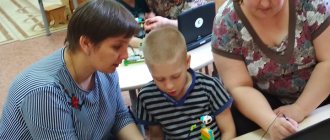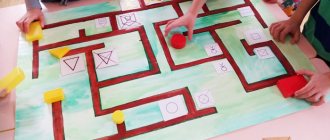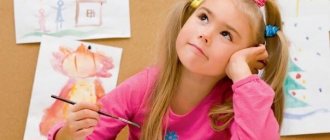Progress of observation: Only golden autumn
The leaf is scorched by fire -
The birch tree flies around,
Feels sad in the rain.
The teacher conducts a conversation with the children: Why did the leaves on the trees turn yellow? What happens to trees in autumn ?
How do trees prepare for winter?
In autumn, the leaves on the trees begin to turn yellow, first at the top, where the air is colder, and then at the bottom. The wind blows, tears off the leaves, and they, like gold coins, fall onto the dark damp ground. Invite the children to collect a bouquet of fallen leaves and note what color the leaves are.
Labor activity: Sweeping paths, collecting garbage.
Goals: to cultivate diligence, the ability to work together; put away equipment after work in a certain place.
Outdoor games: “We are funny guys”
,
"Entertainers"
.
Goals: to teach to follow the rules of the game, to act quickly and deftly;
practice running.
Didactic game: Guess what's in the bag? Purpose: to teach children to describe objects perceived by touch and guess them by their characteristic features.
Individual work: Did. game “What do we take in the basket?”
Goal: to consolidate in children the knowledge of what crops are harvested in the field, in the garden, in the garden, in the forest.
Independent games with external materials, toys, attributes for outdoor games.
Walk 5 . Observing changes in nature with the arrival of late autumn .
Goals: continue observing changes in nature with the arrival of late autumn , promote speech development by enriching vocabulary; cultivate a caring and caring attitude towards the environment and nature
Long-term plan for conducting targeted walks and excursions in senior preschool age September.
Transcript
1 Long-term plan for conducting targeted walks and excursions in senior preschool age September. 1. Group tour. Goal: continue to help children, navigate in the group, clarify and activate in speech the purpose of objects in the group. Foster a careful, caring attitude towards objects in the group. Develop a sense of security and self-preservation. 2. Targeted walk to the neighboring site. Goal: to introduce children to the site and equipment. Develop a sense of security and self-preservation. Develop the ability to observe children's games. 3. Targeted walk to the vegetable tent. Goal: continue to learn to distinguish and name vegetables and fruits; continue to form elementary ideas about autumn changes in nature. 4. Excursion to the roadway. Purpose: surveillance of transport. Learn to recognize and name some types of transport. Develop children's powers of observation and memory. October 1. Tour of the kindergarten. Goal: continue work on familiarization with preschool educational institutions, involve children in the decoration of the foyer (autumn bouquet); Continue getting to know your employees. 2.Targeted walk to the park. Goal: to consolidate children’s knowledge about seasonal changes in nature, about leaf fall; to form initial ideas about the adaptability of plants to their environment. 3. Targeted walk to the station. Purpose: to draw children's attention to the rails on which the train is traveling; explain that the rails are fastened with sleepers. Give the concepts of “railway” and “railway transport”. Develop children's observation, attention, memory. 4. Excursion to the recreation center Purpose: to introduce the sights of the village; teach to see the beauty of the world around us. 5. Excursion to the art gallery of kindergarten 6. Purpose: show children paintings, talk about them, analyze what they saw. November 1. Excursion to a furniture store.
2 Purpose: to consolidate the names of pieces of furniture, their purpose; continue to introduce adults to the work, the content of a salesperson’s work, and develop interest in the profession. 2. Targeted walk around the kindergarten. Purpose: to examine trees, shrubs, grasses; note the changes that have occurred to them. Watching how adults remove leaves and dig up the ground under the bushes. 3. Excursion to the park. Bird watching. Goal: introduce some birds; consider their appearance; compare sparrow and crow. Foster love and respect for living nature. 4. Purposeful walk to the neighboring garden. Goal: to introduce the equipment, look at the building, what trees grow around, how and what children play. Develop observation skills December 1. Target walk to the intersection. Goal: to form ideas about society (sidewalk, roadway, traffic light); continue to familiarize yourself with the basic rules of the road. Reinforce knowledge about the purpose of traffic lights. 2. Excursion to the nurse's office. Goal: continue to introduce professions; introduce the content of a nurse’s work; help draw a conclusion about the benefits of a nurse’s work for children. 3. Excursion to the kitchen. Purpose: to introduce the equipment; continue to introduce professions; introduce the contents of a cook’s work; cultivate interest in this profession. 4. Targeted walk to the Christmas tree installed in the square. Goal: to pay attention to the festive decoration of the Christmas tree, to prepare for the New Year; cultivate an aesthetic sense, the ability to see beauty. 5. Targeted walk and visit to the art school 6. Purpose: visit to the art school, tell the children in detail about clubs and activities, in order to interest them in any type of activity. January 1. Targeted walk to the park. Goal: continue to introduce seasonal changes in nature in winter; teach to pay attention to the beauty of nature; consolidate knowledge about the life of birds in winter, about how a person can help them survive the winter. 2. Excursion to the music director’s office. Goal: to continue to introduce children to the preschool educational institution, the music director’s office, to remind the name and patronymic of the music director, to clarify work actions, and to evoke positive emotions.
3 3. Targeted walk to the cinema building Purpose: to introduce the variety of special equipment; continue to introduce the profession. Expand children's horizons and develop curiosity. 4. Excursion to the construction site. Goal: to introduce children to people with construction specialties (bricklayer, welder, crane operator, plasterer); continue to introduce professions; introduce workers to the content of labor; help draw a conclusion about the benefits of the work of builders for people. February 1. Excursion to the road. Goal: expand children’s knowledge about types of transport, familiarize them with its functions and purpose; continue to introduce professions (driver); develop interest in adult work. 2. Targeted walk to the hospital Purpose: to continue to introduce children to the profession of a doctor, to the doctor’s office; introduce the content of the doctor’s work; help draw a conclusion about the benefits of a doctor’s work for children. 3. Excursion to the methodological room. Purpose: to introduce the office, with aids (books, toys, documents); with the content of the methodologist’s work; recall the name and patronymic of the senior teacher; develop children's observation and attention. 4. A targeted walk to the place where food is delivered to the kindergarten. Goal: examine the car (body, cabin, wheels); monitoring how products are unloaded; continue to get acquainted with special transport; broaden children's horizons. 5. Excursion to the local history museum. Goal: visit the museum, look at the attributes and listen to the guide who will tell you about the history of our village. March 1. Excursion to the pharmacy. Goal: to continue to acquaint children with the work of adults, the content of the work of a pharmacist; generate interest in the profession. 2. Targeted walk around the kindergarten. Purpose: to introduce the first signs of spring; note the behavior of birds; expand your vocabulary by using words denoting signs of spring; cultivate a love for nature, the ability to feel its beauty. 3. Excursion to the roadway. Goal: continue to learn to name and recognize vehicles; assign names of car parts; develop children's powers of observation and memory. 4. Targeted walk to the monument Purpose: to continue to acquaint children with the biography of the heroes
4 5.Excursion to school Purpose: to introduce children to school, to interest them in studying in the future and to talk about the importance of knowledge. April 1. Targeted walk to the monument Purpose: to continue acquaintance with the attraction; cultivate love for one’s native land and a sense of pride in one’s village. 2. Excursion to poplar and birch. Goal: to consolidate children’s knowledge that trees do not die in winter, buds remain on the branches from which green leaves bloom; Plants need warmth to grow; teach children to use examination techniques and talk about their observations; arouse interest in tree observations. 3. Targeted walk to the fire station. Goal: Continue to get acquainted with the work of a firefighter, with the specifics of the firefighter’s profession, and a special-purpose vehicle. 4. Excursion to the laundry. Goal: continue to introduce children to preschool educational institutions and the laundry; continue to introduce professions; introduce the contents of the laundry washing operator’s work; help draw a conclusion about the benefits of working as a laundry operator for children; cultivate respect for the work of other people. 5. Excursion to the post office Purpose: to continue acquaintance with the profession of a postman and the specifics of the profession. Pay attention to special postal service equipment. May 1. Excursion to nature Purpose: to introduce children to phenomena typical of the height of spring (trees and shrubs are covered with leaves, some have flowers; insects have appeared); teach to find friends among many birds; enrich the vocabulary with new words denoting spring phenomena in nature; cultivate interest in observing spring changes in nature. What changes have occurred to the reservoir. 2.Targeted walk to the kindergarten garden. Goal: to consolidate the idea that plants grow from seeds; train children in examination methods; introduce planting techniques; activate children's vocabulary; arouse interest in growing plants. 3. Excursion to the bread store. Purpose: to consider the machine that brings bread to the store, how it is unloaded; continue to introduce children to the work of adults. 4. Targeted walk to the meadow. Goal: observing the changes that have occurred in nature, paying attention to the abundance of flowers, grass, insects; to cultivate the ability to admire the beauty of living nature and take care of it
5
- symptoms of coronavirus in Russia number of people infected with coronavirus in real time
Progress of observation: Powerful transport - truck
I'm used to carrying heavy loads.
What does a car need a body for?
To carry cargo in it!
The teacher asks the children questions: What are trucks for? What are they transporting? Name some types of trucks and explain what they are needed for? Which car do you think is more difficult to drive - a truck or a car?
Labor activity: Cleaning up fallen leaves.
Goals: to teach you to finish what you start; cultivate accuracy and responsibility.
Outdoor games: “Traps”
,
“Children and the Wolf”
. Goals: to teach to follow the rules of the game, to act on the teacher’s signal; develop dexterity.
Didactic game: “Healthy Products”
Goal: to consolidate knowledge about healthy and unhealthy foods, to cultivate a desire to take care of your health.
Individual work: Walking on a log. Goal: to improve walking technique while maintaining balance
Independent games with external materials, toys, balls
Walk 6 . Observation of mountain ash.
Goal: continue to introduce children to rowan.



